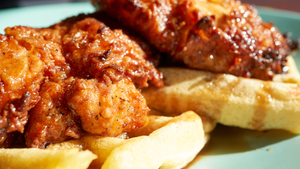Can Pizza Get Any Healthier?
One of the main goals was to find a healthful substitute that reduces the sodium levels found in many frozen supermarket pies.
July 5, 2012
Pizza ranks right up there with hamburgers and hot dogs as one of America’s favorite foods. A slice is almost always affordable and, if prepared with care, can include all of the major food groups. A slice can be as healthy or and indulgent as you want it to be.
 Pizza is easy to find and can be eaten at any time of day (though only the most hearty college student would proclaim cold pizza an ideal breakfast food). It can be purchased fresh in restaurants, eaten in or taken out, consumed on the go or purchased frozen in a supermarket.
Pizza is easy to find and can be eaten at any time of day (though only the most hearty college student would proclaim cold pizza an ideal breakfast food). It can be purchased fresh in restaurants, eaten in or taken out, consumed on the go or purchased frozen in a supermarket.
So, what’s the problem? What’s not to like about pizza? Unfortunately, pizza, along with franks and burgers, is inherently not considered a healthful food. It’s a fun, indulgent food, which is probably why it tastes so good, and is universally enjoyed. If only it could be better for you.
If the industry can’t bring people to choose health when ordering pies, why not bring health to them? Such a proposition is behind the development of “nutritional” pizzas. A Scottish nutritionist has joined forces with an entrepreneur to make the pies that are said to contain 30% of the RDA for numerous vitamins and minerals.
One of the main goals was to find a healthful substitute that reduces the sodium levels found in many frozen supermarket pies.
"They contain as much salt as you should have in a whole day or more,” lamented the pie’s developer, Professor Mike Lean (perfect name, eh?) of Glasgow University. “They contain as much saturated fat as you should have in a whole day or more. The nutrients we need every day are absent from these meals. Nobody has thought about it.”
Approaching the pizza recipe from a nutritional point of view led Lean and his business partner to use seaweed as a more nutritious substitute for pure salt. According to Lean, seaweed delivers great taste with a sodium content of about 3.5% compared to 40% in regular salt. The sea green also provides a nutrient boost since it contains iodine and vitamin B12, he added.
Another trick comes with adding vitamin-rich red pepper to the tomato sauce. This provides an extra kick of vitamin C.
Each pizza gives a complete meal, with all the nutrients in it, for 30% of your day," said Lean.
If this idea works, then lets hope Lean is willing to tackle hot dogs and hamburgers.
About the Author
You May Also Like






